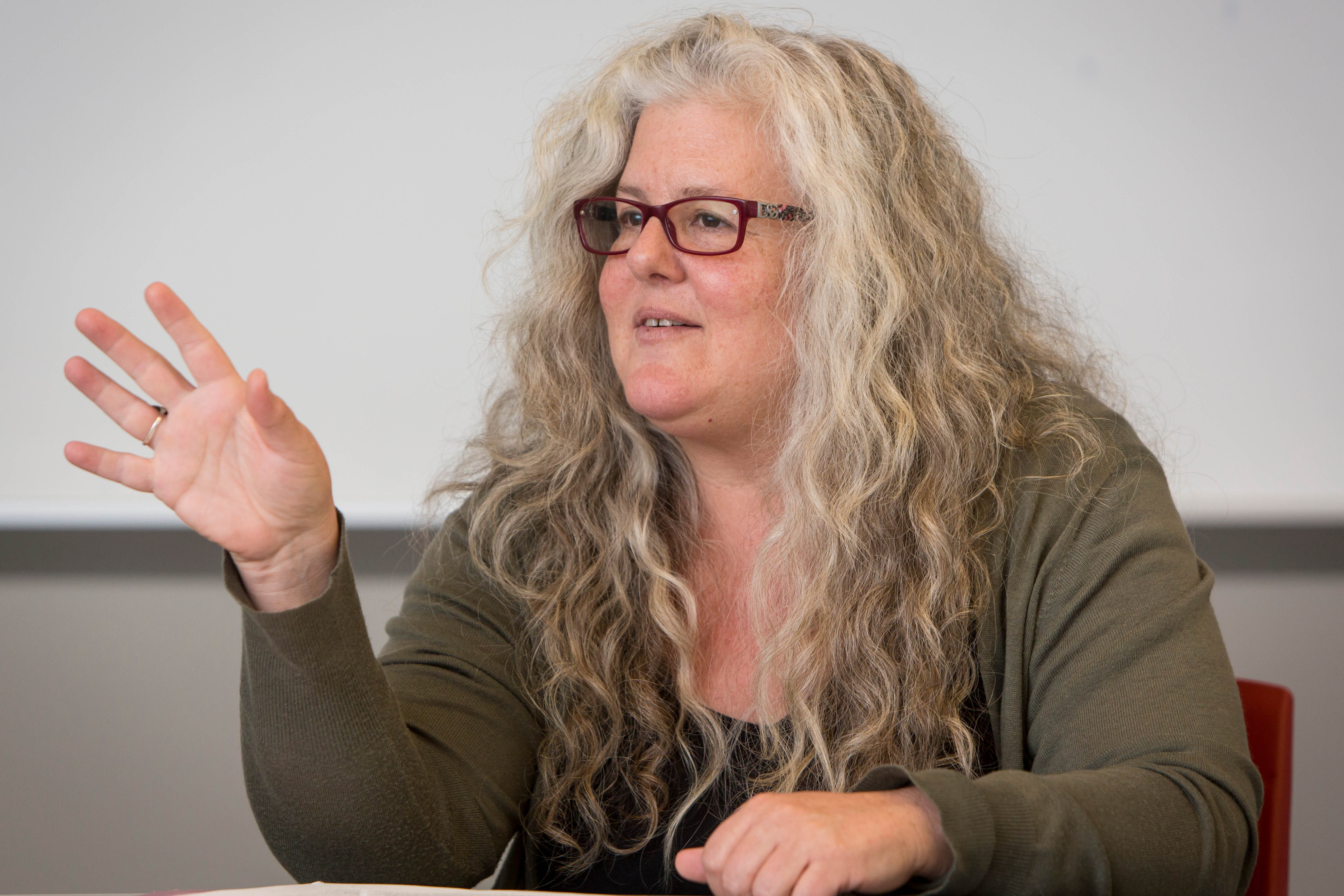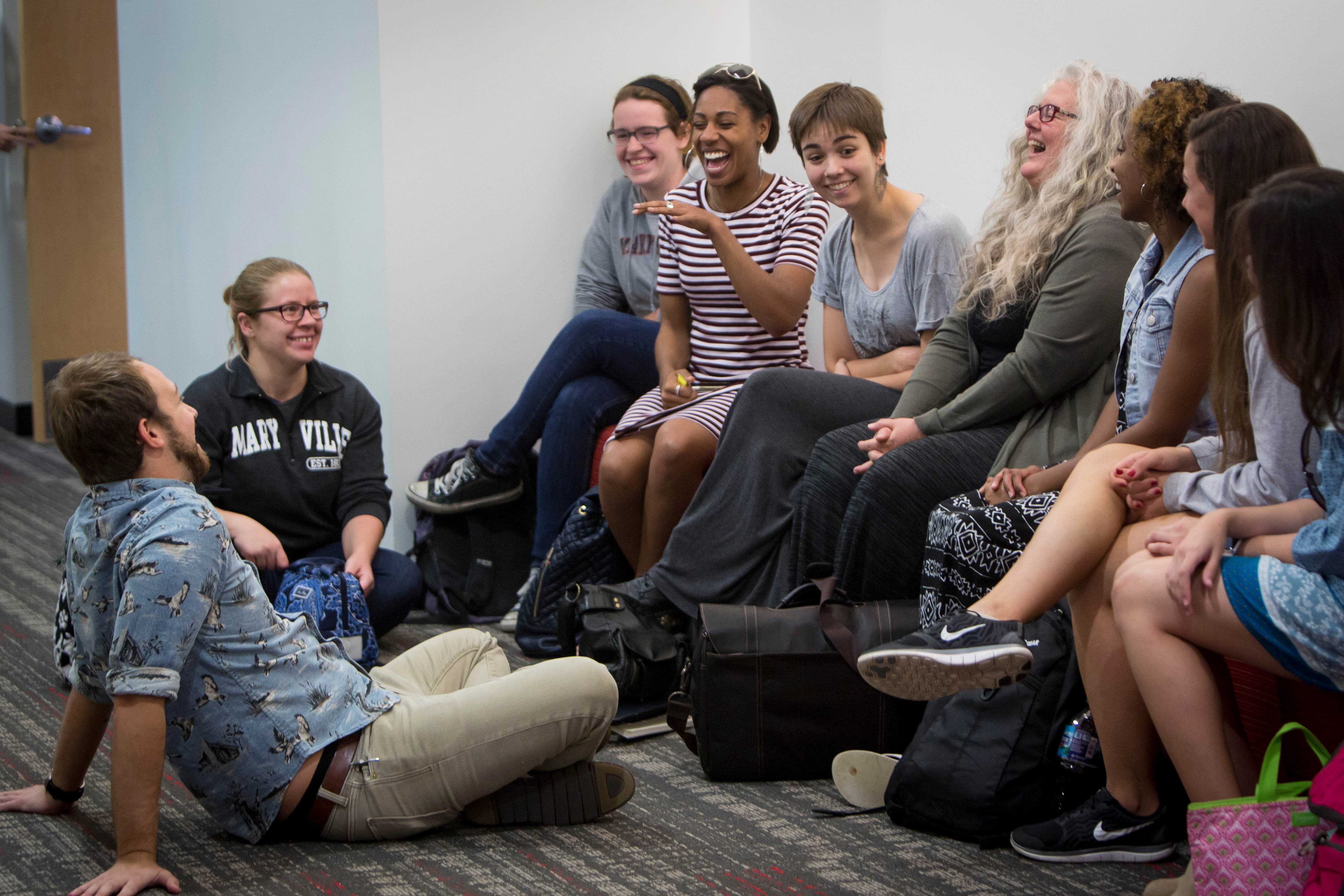The appointment of poet Dana Levin as Maryville’s first Distinguished Writer-in-Residence has inspired a rising student interest in creative writing and energized the new narrative arts concentration in the English program, offered through the College of Arts and Sciences.
 Levin, who lives in Santa Fe, New Mexico, first arrived on campus in Fall 2015 and will return each fall semester to teach courses in writing, literature and independent study.
Levin, who lives in Santa Fe, New Mexico, first arrived on campus in Fall 2015 and will return each fall semester to teach courses in writing, literature and independent study.
Engaging in art of any kind, she says, is “soul work” — and it’s imperative.
“Art is a primary way for college students to have an experience inside themselves. At a school like Maryville, this is of extra importance because so many are studying in fields of practical application,” Levin says. “We need to provide students with an opportunity to complement their experiences in STEM education and art is the best way I know to do that.”
Engaging in art of any kind is “soul work” — and it’s imperative.
Levin’s own soul work began in elementary school, when she wrote her first poem about a film the class was shown. Students were asked to describe the film in a paragraph.
“It was a cartoon about an astronaut being pursued through the cosmos by a monster,” she says. “I thought about the words I would use to describe this film — chase, space, race, place — and because the words sounded the same I wanted to write a poem instead of a paragraph.”
Her teacher said yes.
“I’ve been really lucky that from my elementary years through college I’ve had some really amazing teachers who gave me room to be myself and bend rules.”
They inspired Levin to teach writing, which she has done at the college level for the past 20 years.
“… In relation to gun violence, Ferguson and the election year, poetry is answering a call; we’re feeling a lot of disturbance. Young poets want to talk about this.”
“It’s so delightful and exciting to encounter someone who has a natural facility,” she says. “I help them become aware of their talent by saying, ‘Hey, look at what you’re doing! It has a name! You have the right intuitions to be a poet. I can help you do that structurally and professionally.’”
Even for students interested in the subject but who aren’t aspiring poets, Levin offers up a lively classroom.
“Her teaching style is craft-oriented and passionate, with a dash of magic and electricity,” says Luke Layden, ’16. He is Levin’s teaching assistant this semester and is applying to MFA writing programs.
Levin shares both writing and publishing expertise with students. Her fourth book of poetry, Banana Palace, debuted in October. Her first book, In the Surgical Theatre, was chosen by Pulitzer prize-winning author Louise Glück — Levin’s longtime mentor — for the 1999 American Poetry Review/Honickman First Book Prize and received nearly every award available to first books and emerging poets. She has also written Sky Burial and Wedding Day.
Most recently, Levin served as former co-chair and faculty member of Creative Writing and Literature at Santa Fe University of Art and Design in Santa Fe, New Mexico.
Levin’s poetry has been described as image-driven, surprising, complex, challenging and celebratory. A New Yorker review of Sky Burial called Levin’s material “utterly her own, and utterly riveting.”
The reviews could easily be applied to her teaching style.
Levin’s poetry has been described as image-driven, surprising, complex, challenging and celebratory. A New Yorker review of Sky Burial called Levin’s material “utterly her own, and utterly riveting.”
“Dana’s lecturing style is very informal and she encourages both critical thought and laughter in the classroom,” observes junior Rachel Luebke. “She is straightforward, earthy yet energetic and insists on an atmosphere of respect.” Luebke is majoring in English and aspires to be a writer.
Levin is practical about the business of becoming a writer.
“Talking to a talented student about a life in poetry, you have to tell them there’s not going to be remuneration,” she says. “And they will have to work in the world and maybe they’ll be lucky enough to maintain a life in poetry.”
Teaching poetry to undergraduates presents some challenges, not the least of which is that students are typically taught to read through an analytical lens, Levin says.
“Reading poetry is a very different experience than reading a textbook or even a novel. We’re trained to read for information and theme; trained to bring our analytical minds to what we read,” she says. “Poetry is interested in subverting that kind of reading. Even the line breaks—why is a sentence broken in two? It’s hard to negotiate that. Reading out loud, you hear it. So, a lot of what I’m doing at introductory level is modeling for students how to read poems.”
Keeping up with the vast expanse of poetry is no easy task—there are many American poets Levin wants her students to discover early on. And that says nothing of contemporary poets.
“Up until now, our last true public poet to my mind was Allen Ginsberg,” Levin says. “Claudia Rankine, with her book Citizen, published in 2014, became our next real public poet. The reception of that book caused a big turn back to the civic—and of course in relation to gun violence, Ferguson and the election year, poetry is answering a call; we’re feeling a lot of disturbance. Young poets want to talk about this.”
What they want to discuss is where we are right now, politically and socially, Levin says, and the conversation has brought increasing attention to poetry.
“More poetry is being published and there more readers, more outlets for publishing than I’ve ever experienced,” Levin says. “Social media has tremendously helped dissemination—it’s made poetry more accessible.”
Inside Levin’s Writing Poetry classroom, students create original work and study the literature of others, including the poems of their classmates. These poems are critiqued in structured workshops.
“Some students are scared to share,” Levin says, noting the feeling is understandable. “It’s hard to have 14 people weigh in on your poem.”
But students see the value in the exercise, even if it causes some anxiety at first. They are writers of all levels, beginning to advanced.
“She meets us at our individual levels and encourages us to step out of our comfort zones,” says Luebke. “Her workshops have greatly improved my ability to give constructive criticism, and by evaluating the works of my classmates, I’m learning to evaluate my own work.”
To learn more about Dana Levin and explore her works, visit danalevinpoet.com.
 Dana Levin.magazine.H
Dana Levin.magazine.H